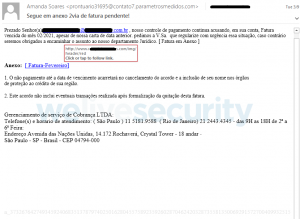Money doesn’t buy you happiness – cryptocurrency doesn’t buy you a genuine COVID-19 vaccine
INTERPOL and the United States’ Homeland Security Investigations (HSI) have joined the chorus of warnings about online campaigns peddling bogus COVID-19 vaccines as cybercriminals are increasingly attempting to exploit nations’ vaccination programs.
“With criminal groups producing, distributing, and selling fake vaccines, the risks to the public are clear: these can include buying a product which not only does not protect against COVID-19, but poses a serious health hazard if ingested or injected. Such products are not tested, regulated or safety-checked,” reads the alert.
Indeed, COVID-19 vaccines are subject to strict scientific and regulatory practices and are only distributed and administered by national healthcare providers. Therefore, if you stumble upon an offer to purchase them online rather than obtaining your shots from your healthcare provider, you’ll most definitely be ordering a fraudulent product.
To be sure, campaigns involving all sorts of fake promises around COVID-19 cures and vaccines are by no means new. “From the very beginning of the pandemic, criminals have preyed on people’s fears in order to make fast cash. Fake vaccines are the latest in these scams, which is why INTERPOL and HSI are warning the public to be extra vigilant,” said INTERPOL chief Jürgen Stock.
While fraudsters initially swamped the internet with various coronavirus-themed scams, including by impersonating the World Health Organization and creating fake marketplaces to peddle high-demand low-supply goods such as facemasks, news of vaccines caused them to pivot to vaccination-themed scams and hoaxes.
Fake marketplaces
Cybercriminals have been ramping up their efforts by creating counterfeit websites masquerading as legitimate national or global organizations offering the option to pre-order COVID-19 vaccines and pay with Bitcoin.
To make their ploy seem as legitimate as possible, fraudsters are using trademarked logos of major pharmaceutical companies involved in the manufacturing of approved COVID-19 vaccines. INTERPOL suspects that the fake sites are used to carry out phishing attacks, as well as trick unsuspecting victims into donating to non-existent charities.
Beyond losing money, prospective buyers may be opening themselves up to various other problems, including health risks and identity theft. For example, in December the HSI shut down two websites, impersonating biotech companies, that purported to offer COVID-19 treatment, but that in reality harvested personal information that could be used in all manner of fraud and crimes.
Malicious actors have also set their sights on various pharmaceutical companies and organizations involved in vaccine development production and approval, even going as far as hacking the European Medicines Agency.
How to stay safe
Since many of us are still eagerly waiting our turn for the jab, we’ve compiled some tips to help protect you from falling prey to enterprising cybercriminals.
- Be wary of any unsolicited messages offering to sell you vaccines, especially if they want you to pay in cryptocurrency or request your personal data
- Consult your local healthcare authority and official governmental sources for up-to-date information about vaccination
- If you receive an email allegedly coming from an official organization, check their official website and contact them through their official channels to determine whether they really sent the email
- Avoid clicking on links or downloading any attachments in emails that came from an unknown source you cannot independently verify
- Use a full-featured security solution that includes protection against, spam, phishing attempts, and other threats
- Enable two-factor authentication on your most sensitive accounts

